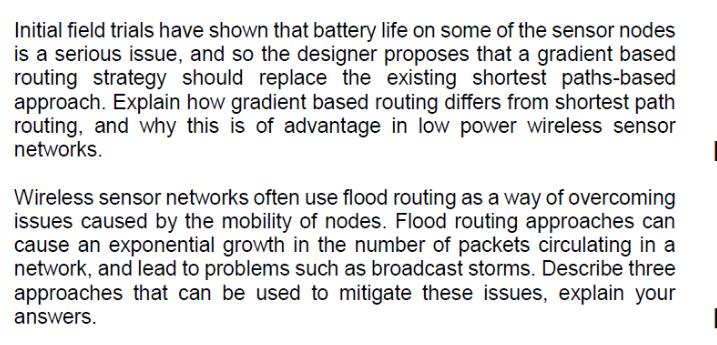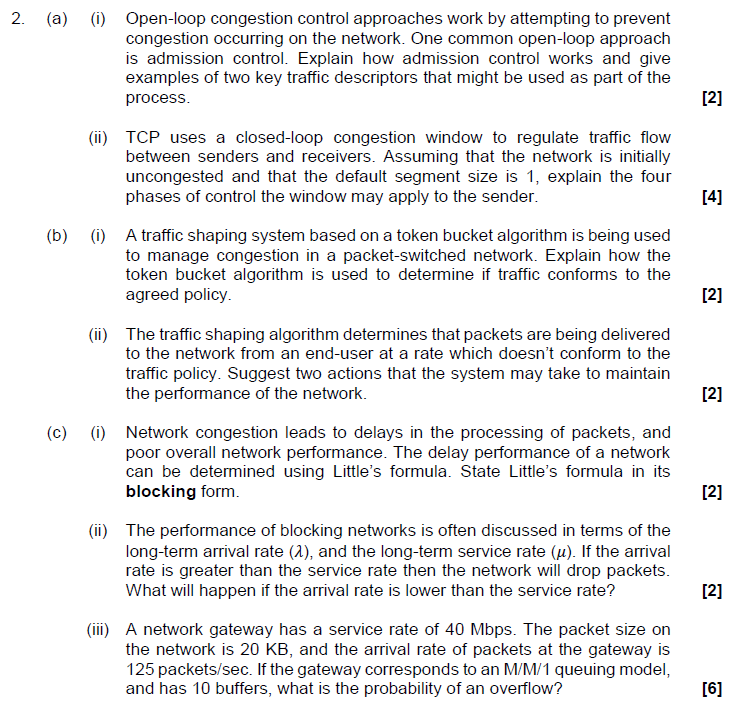Answered step by step
Verified Expert Solution
Question
1 Approved Answer
Initial field trials have shown that battery life on some of the sensor nodes is a serious issue, and so the designer proposes that


Initial field trials have shown that battery life on some of the sensor nodes is a serious issue, and so the designer proposes that a gradient based routing strategy should replace the existing shortest paths-based approach. Explain how gradient based routing differs from shortest path routing, and why this is of advantage in low power wireless sensor networks. Wireless sensor networks often use flood routing as a way of overcoming issues caused by the mobility of nodes. Flood routing approaches can cause an exponential growth in the number of packets circulating in a network, and lead to problems such as broadcast storms. Describe three approaches that can be used to mitigate these issues, explain your answers. 2. (a) (b) (C) (i) Open-loop congestion control approaches work by attempting to prevent congestion occurring on the network. One common open-loop approach is admission control. Explain how admission control works and give examples of two key traffic descriptors that might be used as part of the process. (ii) TCP uses a closed-loop congestion window to regulate traffic flow between senders and receivers. Assuming that the network is initially uncongested and that the default segment size is 1, explain the four phases of control the window may apply to the sender. (i) A traffic shaping system based on a token bucket algorithm is being used to manage congestion in a packet-switched network. Explain how the token bucket algorithm is used to determine if traffic conforms to the agreed policy. (ii) The traffic shaping algorithm determines that packets are being delivered to the network from an end-user at a rate which doesn't conform to the traffic policy. Suggest two actions that the system may take to maintain the performance of the network. (i) Network congestion leads to delays in the processing of packets, and poor overall network performance. The delay performance of a network can be determined using Little's formula. State Little's formula in its blocking form. (ii) The performance of blocking networks is often discussed in terms of the long-term arrival rate (2), and the long-term service rate (). If the arrival rate is greater than the service rate then the network will drop packets. What will happen if the arrival rate is lower than the service rate? (iii) A network gateway has a service rate of 40 Mbps. The packet size on the network is 20 KB, and the arrival rate of packets at the gateway is 125 packets/sec. If the gateway corresponds to an M/M/1 queuing model, and has 10 buffers, what is the probability of an overflow? [2] [4] [2] [2] [2] [2] [6]
Step by Step Solution
There are 3 Steps involved in it
Step: 1

Get Instant Access to Expert-Tailored Solutions
See step-by-step solutions with expert insights and AI powered tools for academic success
Step: 2

Step: 3

Ace Your Homework with AI
Get the answers you need in no time with our AI-driven, step-by-step assistance
Get Started


